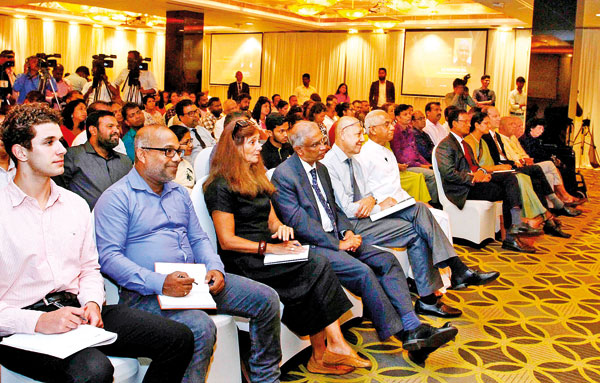News
ECTA to open opportunities for trade and economic cooperation: Indian High Commissioner
View(s):By Dilushi Wijesinghe
“Sri Lanka was the first to sign a free trade agreement in 1998. That was a first for Sri Lanka but also for India,” he said.
He was speaking at an interactive event organised by the Sri Lanka Press Institute (SLPI) at the Colombo Hilton on Tuesday on the topic “The India Story: Reform, Perform, Transform.”

A section of the audience at the event
Event host and SLPI chairman Kumar Nadesan opened the question-and-answer session, recounting how he was being inspired by a recent visit to India. He discussed India’s digital, economic, and technological transformation.
Mr. Jha commenting on the long-term vision of the Prime Minister Narendra Modi, named ‘Viksit Bharat’ which translates to ‘Developed India’, said: “We hope to achieve this by 2047 when we celebrate 100 years of our independence”.
Commenting on the educational developments, he said: “There’s a demand for Indian talent, not just in what we do in India but all across the world. Four and a half million Indians live in the United States, and contribute to its economy. If you look at the top technology companies, most CEOs are Indians, so that tells you about the educational aspect of it and the talent potential of India.’’
Speaking on Indo-Lanka relations, Mr. Jha spoke about the oil pipeline connecting India and Sri Lanka while highlighting that “we are talking about an LNG supply line to bring LNG to Sri Lanka to be used for energy production, which will reduce the cost of energy here (in Sri Lanka).”
Mr. Jha also revealed that plans for a power grid interconnection are being discussed.
“The huge potential that Sri Lanka has in terms of producing renewable energy, wind and solar cannot be used simply within Sri Lanka, and it requires an outlet for export to other parts of the world through India,” he said.
In response to the development of the land-bridge connection, he said, “We build 30 kilometres of highways every day. Our target is to increase it to 40 km in 2024.
“Our effort has been that wherever we have capacities, we must contribute as far as possible based on Sri Lanka’s preference to contribute to their growth and development.’’
Shifting to the topic of food security in Sri Lanka, he said: “Food security is a global problem. It’s not just a problem of Sri Lanka or India alone; it’s something we want to work on with all developing countries. Our approach has been—whatever capacities we have, our first take on that would be for the developing countries, and among the developing countries, naturally, first come the neighbours, so the neighbourhood-first policy of India requires that we work with Sri Lanka first.”
Commenting on the speed of implementing projects, Mr. Jha said the Gathi Shakthi programme, which focuses on size, scale and speed, was a “mechanism of supervision of existing projects on an ongoing basis at the highest level.”

SLPI chairman Kumar Nadesan and Indian High Commissioner Santosh Jha Pix by Indika Handuwala
As for the Indo-Lanka ferry service, he said: “The problem is the high fare, and there’s a need to subsidise it. On our side, we have taken the decision to do so. We will be paying a very large amount of money in millions of Sri Lankan rupees every day to make that trip economically viable. The Government of Sri Lanka has taken some decisions to give some concessions, so in combination, it is now possible to run the ferry, but so far we have not succeeded.’’
He hopes the Talaimannar and Rameshwaram services will begin “before the end of this month’’.
The best way to say that you found the home of your dreams is by finding it on Hitad.lk. We have listings for apartments for sale or rent in Sri Lanka, no matter what locale you're looking for! Whether you live in Colombo, Galle, Kandy, Matara, Jaffna and more - we've got them all!

